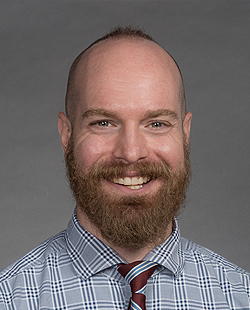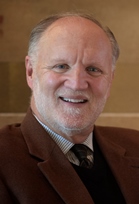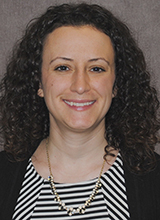Personal Statement
My primary clinical interest and expertise is in the evaluation and treatment of women with mental health issues during pregnancy and postpartum, as well as women’s mental health throughout the life cycle, including premenstrual and menopause-related psychiatric symptoms. In addition, I am interested and experienced in evaluation and treatment of anxiety disorders and depression.
Personal Statement
My primary interests are in diagnostic evaluation, psychiatric methods, psychosomatic medicine, fatigue syndromes, pain disorders, abnormal illness behaviors, and human temperament and personality. I have conducted research jointly with colleagues at the University of Washington and the University of Washington Twin Registry on chronic widespread pain, depression and related phenomena.

Personal Statement
My career goal is to give suicidal clients and their clinicians the best chance to succeed. I have been working in the area of health services, treatment development, and clinical trials research to prevent suicide for over 20 years. My graduate training was in community/clinical psychology and focused on achieving clinical ends through prevention and other systemic interventions in socio-culturally diverse populations. I have brought these perspectives into health services research. I have developed or adapted interventions to improve care and clinician willingness to work with suicidal patients including Caring Contacts, Dialectical Behavior Therapy (DBT), Collaborative Assessment and Management of Suicidality (CAMS), and Preventing Addiction Related Suicide (PARS). I have developed an adaptation of DBT, Accepting the Challenges of Employment and Self-Sufficiency (DBT-ACES), a program to assist psychiatrically disabled individuals find and maintain living wage employment. My research has been funded by NIMH, NIDA, the Department of Defense, American Foundation for Suicide Prevention, the Department of Veteran Health Affairs, and the State of Washington.
I am the director of the Center for Suicide Prevention and Recovery (CSPAR) whose mission is to promote the recovery of suicidal individuals and the effectiveness and well-being the clinicians and families who care for them by conducting rigorous and ecologically valid research, developing innovative interventions, improving policies, systems and environments of care, and providing expert training and consultation. CSPAR faculty and staff seek a deep understanding of the cultures and settings in which we work that leads to meaningful and effective interventions ready for implementation.
In addition to clinical research, I founded the Society for Implementation Research Collaboration (SIRC) and am the PI and Director of the Military Suicide Research Consortium Dissemination and Implementation core. These organizations focus on disseminating and implementing innovative, evidence-based interventions in the systems that need them. Beyond my research, I directed the Harborview Dialectical Behavior Therapy program at Harborview Medical Center 1996-2019, co-lead the UW DBT Training Program and have a long history of training and mentoring junior faculty, fellows, psychiatry residents, pre-doctoral psychology interns, undergraduate students, and post-baccalaureate trainees. I provide psychotherapy and consultation at the UWMC Outpatient Psychiatry Clinic.
Personal Statement
Early in my training it became clear that intense pathology transfixed me so inpatient psychiatry was a natural fit. My specific area of expertise within psychiatry is care of the acutely ill hospitalized psychiatric patient. I have also developed clinical expertise in the diagnosis and management of Catatonia. In addition to clinical care, education is another area of interest. I love to teach and it has been the focus of my career. I am intimately involved in the education of psychiatry residents and am a founding faculty member of the Clinician-Teacher Pathway for our residency program. In addition to teaching medical students and residents, I regularly educate primary care providers on detection and treatment of psychiatric illnesses in primary settings. I assumed the role of Vice Chair of Education in 2020 and in that role I oversee all educational efforts for our department.

Personal Statement
As a clinical and forensic psychiatrist, my professional roles include being the Director of the UW Center for Mental Health, Policy, and the Law; Associate Professor in the Department of Psychiatry; and a Staff Psychiatrist at the VA Puget Sound. I hold multiple board certifications: Psychiatry, Forensic Psychiatry, Brain Injury Medicine, and Sports and Performance Psychiatry. In addition to my medical training, I earned my law degree from the University of Washington.
As a member of the American Academy of Psychiatry and the Law (AAPL), I serve on the Ethics, Research, and Resident Education Committees and I twice earned AAPL’s Young Investigator Award. I am the Legal Digest Editor for the Journal of the American Academy of Psychiatry and the Law.
I have served as an expert witness or consultant in legal cases involving criminal and civil competencies; criminal responsibility; malpractice; personal injury; sexual and gender harassment; and fitness for duty, among others. I teach courses in forensic mental health at the University of Washington and speak locally and nationally on topics related to psychiatry and the law.
Personal Statement
I completed my Residency in Psychiatry with the UW in 1982 and since then have worked at Harborview Medical Center in the Psychiatry Department. I am a Clinical Associate Professor and provide weekend and on-call coverage for 5MB on the Intensive Psychiatric Unit.
Personal Statement
I am a psychiatrist at the UW Outpatient Psychiatry Clinic (OPC) on Roosevelt, where I see patients for consultation, medication management, and psychotherapy, both individually and with psychiatry residents. I see patients with mood disorders, anxiety disorders, trauma, and complex trauma. I also help answer a consultation line for providers in the state of Washington who have questions about psychiatric medications during the perinatal period.
I serve as an Associate Program Director in the Psychiatry residency, where I help oversee the curriculum. My areas of interests are resident education, psychodynamic psychotherapy, outpatient psychiatry, perinatal psychiatry, and diversity, equity, and inclusion.
Personal Statement
I have focused my clinical and research interests on the complex intersection of chronic medical illness and serious mental illness. I have had clinical training in both internal medicine and psychiatry, and my clinical work over the past decade has included the provision of inpatient and outpatient medical care within an urban community mental health center. Through an NIMH-funded K23 (career development award), I have investigated the prevalence of cardiovascular risk factors among veterans with serious mental illness, and the healthcare costs and disparities of this vulnerable population. My current projects include an NIDDK (R21) grant to develop and pilot test an innovative community mental health center-based team approach to the treatment of poorly controlled type 2 diabetes among outpatients with schizophrenia.

Personal Statement
I am a basic neuroscientist, a board-certified practicing psychiatrist, and an Assistant Professor of Psychiatry and Behavioral Sciences at the University of Washington Medical School. The goal of my research is to investigate the neural circuitry of cognitive, emotional and memory processing, particularly as it relates to the cerebellum, and illnesses affecting cerebellum including cognitive disorders, PTSD, TBI and dementia through the implementation of techniques in mouse behavioral genetics. In my clinical practice, I primarily see veterans with PTSD, mild cognitive impairment, and various forms of dementia in an outpatient clinic at the VAMC Puget Sound Geriatric Research, Education, and Clinical Center (GRECC) in Seattle. I have over 15 years of experience in basic science research with most of that time dedicated to the use of mouse models of neuropsychiatric disorders.
Throughout my training prior to and during graduate school, I gained background in many contemporary molecular and biochemical lab techniques, such as molecular cloning, protein biochemistry, protein crystal production, fluorometric measurement of protein kinetics, in vivo NMR spectroscopy, gene targeting, microarray genomics, immunohistochemistry, and mammalian cell culture. I have a foundation in mouse genetics, neural development, and behavior which I developed in Michael Georgieff’s lab by investigating the role of iron in developing pyramidal neurons of the mouse hippocampus. During graduate training, I also received cross-training in child psychological development. In graduate school, I developed two mouse models of nonanemic neuron specific iron deficiency: 1) a conditional knockout of the Slc11a2 gene, encoding the iron transporter DMT-1 in forebrain neurons, including hippocampal pyramidal neurons, and 2) a transgenic mouse with a reversibly inducible dominant negative (nonfunctional) form of the transferrin receptor expressed only in hippocampal pyramidal neurons. I utilized and implemented different versions of the Morris Water Maze to study learning deficits in these mouse models of perinatal brain iron deficiency, a condition that is often a consequence of diabetes during pregnancy.
During my residency training, I expanded my knowledge of neuropsychiatric disorders by directly evaluating and treating patients with neuropsychiatric disorders including PTSD, schizophrenia, Alzheimer’s disease, autism, major depression, substance abuse disorders, and personality disorders. I learned numerous pharmacological, neuromodulatory, and psychotherapeutic interventions and participated in the internally funded Neuroscience Research Track. I then received a NIMH career development award (K08) mentored by Larry Zweifel, Ph.D. In that position, I investigated interactions between catecholamines and the cerebellum in decision making, emotional and cognitive processing. In the 5 years I was in Dr. Zweifel’s lab, I learned many additional new techniques including use of viral vectors, in vivo electrophysiology, and several operant- and threat-based behaviors, and moved forward in my goal of becoming a physician scientist isolating important circuits underlying etiology of specific domains of behavioral function. This work culminated in my receiving an RO1 independent investigator award, without any gap in funding.
My current research utilizes mouse behavior, in vivo electrophysiological recordings, gene targeting, viral vectors, translational profiling, chemo- and optogenetic tools, site-specific intracranial viral vector injection, and protein chemistry. I am now forging my path as an independent investigator, and my primary goal is to understand cerebellar circuits as they relate to psychiatric and neurodegenerative illnesses and utilize this knowledge to inform and improve current and novel psychiatric illnesses, primarily in cognitive and emotional domains. As such, I am pursuing a multidisciplinary approach combining genetic, electrophysiological, pharmacological, and behavioral techniques.









